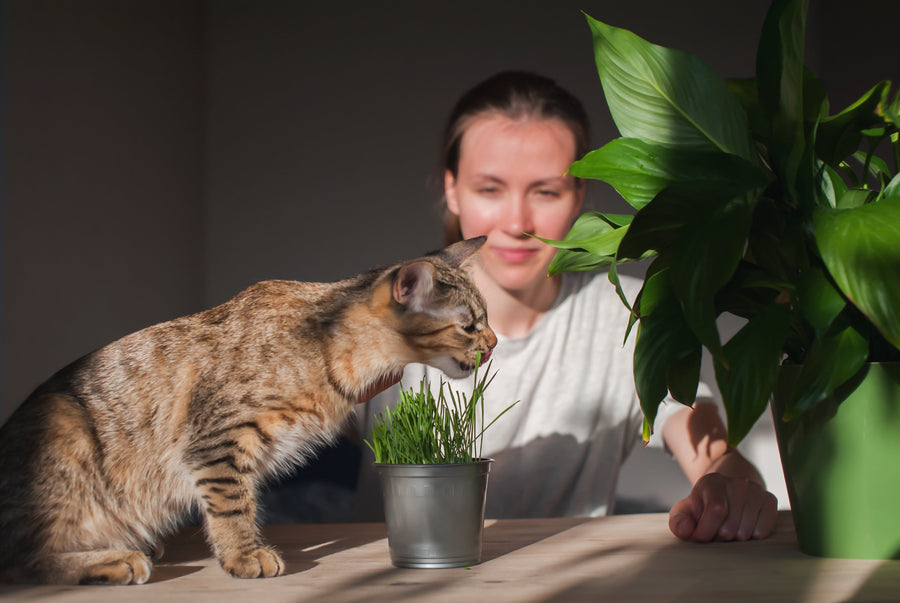When most people think of cats and herbs, the first thing that comes to mind is catnip. Famous for sparking playful euphoria, catnip’s aroma can send cats rolling, drooling, and purring with delight. But when eaten, catnip has the opposite effect—helping cats mellow and unwind.
Catnip is just one herb with benefits for cats, and there are many others worth knowing. Since anxiety is a reality for so many cats, calming herbs can be a valuable, natural tool for pet parents.
Understanding Cat Anxiety
Cats may seem independent and unbothered, but stress and anxiety are surprisingly common. Studies suggest that 20–25% of cats show signs of anxiety significant enough to seek veterinary attention.
Anxiety occurs when a cat’s “fight-or-flight” response stays activated. Instead of being calm and grounded, your cat may live in a constant state of worry or anticipation of danger.
Common Causes of Anxiety in Cats
-
Separation: Time apart from their favorite person can trigger distress.
-
Illness or pain: Aging and health conditions may bring discomfort and unease.
-
Lack of early socialization: Cats not exposed to people or animals during the key 7–12 week window may be more fearful later in life.
-
Trauma: Abuse, accidents, or frightening events can leave lasting imprints.
-
Obsessive tendencies: Certain breeds, like Siamese cats, may be more prone to compulsive behaviors that fuel anxiety.
Signs Your Cat May Be Anxious
Cats express anxiety in many ways. Look for:
-
Hiding, trembling, or crouching.
-
Avoiding eye contact or turning their head away.
-
Over-grooming, destructive behavior, or aggression.
-
Litter box issues or marking.
-
Vomiting, diarrhea, or loss of appetite.
Noticing these cues early allows you to provide the right support.
Calming Herbs for Cats
Just as with people, herbs can help bring the nervous system back into balance. Here are some of the most widely used calming herbs for cats:
-
Catnip (Nepeta cataria) – May spark play when sniffed, but when ingested, catnip can promote relaxation and better sleep.
-
Chamomile (Matricaria recutita) – Traditionally used to calm nerves and settle the stomach, chamomile may gently ease tension in cats.
-
Hops (Humulus lupulus) – Best known for its role in brewing, hops also has a history of supporting calm and relaxation.
-
Valerian (Valeriana officinalis) – Valerian root may help calm excitability and encourage restful sleep.
-
Lemon Balm (Melissa officinalis) – A member of the mint family, lemon balm has soothing qualities that may help ease anxiety.
-
Skullcap (Scutellaria lateriflora) – Known to support nervous system balance, skullcap may reduce restlessness and tension.
-
California Poppy (Eschscholzia californica) – A gentle herb that may help quiet the mind and promote relaxation, without any opiate content.
These herbs are often combined into safe, glycerin-based formulas designed specifically for cats.
Supporting a Calm Environment
Herbs are most effective when paired with thoughtful care. You can help your cat feel safe by:
-
Providing cozy, quiet spaces to retreat.
-
Keeping routines consistent.
-
Offering gentle reassurance without scolding.
-
Minimizing loud noises and stressful environments.
-
Ensuring their health is monitored with regular veterinary visits.
Together, these steps can help your feline friend feel secure and supported.
At Animal Essentials, we craft herbal blends like Tranquil Times to bring cats the gentle, natural support they need. If you’d like to learn more about herbs for cats, or need help choosing the right formula, email us anytime at info@animalessentials.com.

